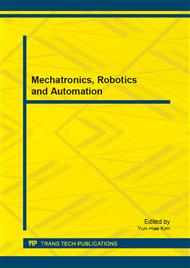[1]
Li WANG, Chun-sheng CHEN, Yu-hua HUANG, Report on development of China's service outsourcing (2010~2011 ) (Book style). Beijing: Social Science Document Publishing House, (2011).
Google Scholar
[2]
Jing LU, Research on evaluation of knowledge transfer competence in knowledge process outsourcing (KPO) (Thesis or Dissertation style), Master dissertation, Central China Normal University, Wuhan, China, (2012).
Google Scholar
[3]
Ying-hui SUI, Hai-yang DING, KPO: Forming Factors, Characteristics and Path (Periodical style), Shandong Economy, vol. 2, pp.14-18, (2008).
Google Scholar
[4]
Yan-fen LIU, Risk and Controlling of the Intellectual Property in KPO (Thesis or Dissertation style), Master dissertation, Central China Normal University, Wuhan, China, (2012).
Google Scholar
[5]
Wei-jun WANG, Chun-men GAN, Advent of KPO and Innovation of Science and Technology Information services in China (Periodical style), Library and Information Service, vol. 54, no. 12, pp.22-25, (2010).
Google Scholar
[6]
Feng CHEN, Zhan-ping LIANG, On the Application of SWOT in the Competitive Intelligence Practice in China (Periodical style), Journal of the China Society for Scientific and Technical Information, vol. 20, no. 6, pp.720-727, (2001).
Google Scholar
[7]
Shi-wei XU, A Study on Developing Business of Competitive Intelligence of the SW Information Center (Thesis or Dissertation style), Master dissertation, Chongqing University, Chongqing, China, (2004).
Google Scholar
[8]
Jian DU, Application of Media Analysis in Enterprise CI Activities (Periodical style), Competitive Intelligence, vol. 10, no. z1, pp.35-39, (2007).
Google Scholar
[9]
Li-chao ZHANG, Jun-min FANG, Shi-lei GAO, The Concept, Significance and Research Category of Industrial Competitive Intelligence (Periodical style), Journal of Intelligence, vol. 29, no. 6, pp.152-156, (2010).
Google Scholar
[10]
Chang-huo BAO, Xin-zhou XIE, Collection and analysis of patent information (Book style). Beijing: Tsinghua University Press, (2007).
Google Scholar
[11]
Lipu TIAN, The Present Situation and Development Trend Report of Industries of Patent Technologies ( 2008-2009 ) (Book style). Beijing: Intellectual Property Publishing House, (2009).
Google Scholar
[12]
Jing-li PENG, Zu-tang DING, Yong ZHANG, Xing KE, Research on the Competitive Technical Intelligence Based on Intellectual Property Right & Its Strategic Analysis (Periodical style), Information Studies: Theory & Application, vol. 31, no. 6, pp.834-839, (2008).
Google Scholar
[13]
Yan-ning ZHENG, The Key Issues of Innovative Development for Chinese S&T Information Industry (Periodical style), Journal of the China Society for Scientific and Technical Information, vol. 27, no. 6, pp.946-950, (2008).
Google Scholar
[14]
Chen-sheng WU, Xiao-ming ZHANG, Yu WANG, Lu-ji ZHANG, A Choice to Enhance the Public Scientific Literacy (Periodical style), Science, vol. 61, no. 6, pp.50-53, (2009).
Google Scholar
[15]
Xin-zhou XIE, Chen-xi XIA, State of the Art and Development Tendency of CTI—A Review of the International Forum of Technical Innovation and Competitive Technical Intelligence (2008).
Google Scholar
[16]
Yan-ning ZHENG, Researches on the Core Business of the Scientific and Technical Information Institutions in China (Periodical style), Information Studies: Theory & Application, vol. 30, no. 4, pp.444-446, (2007).
Google Scholar


